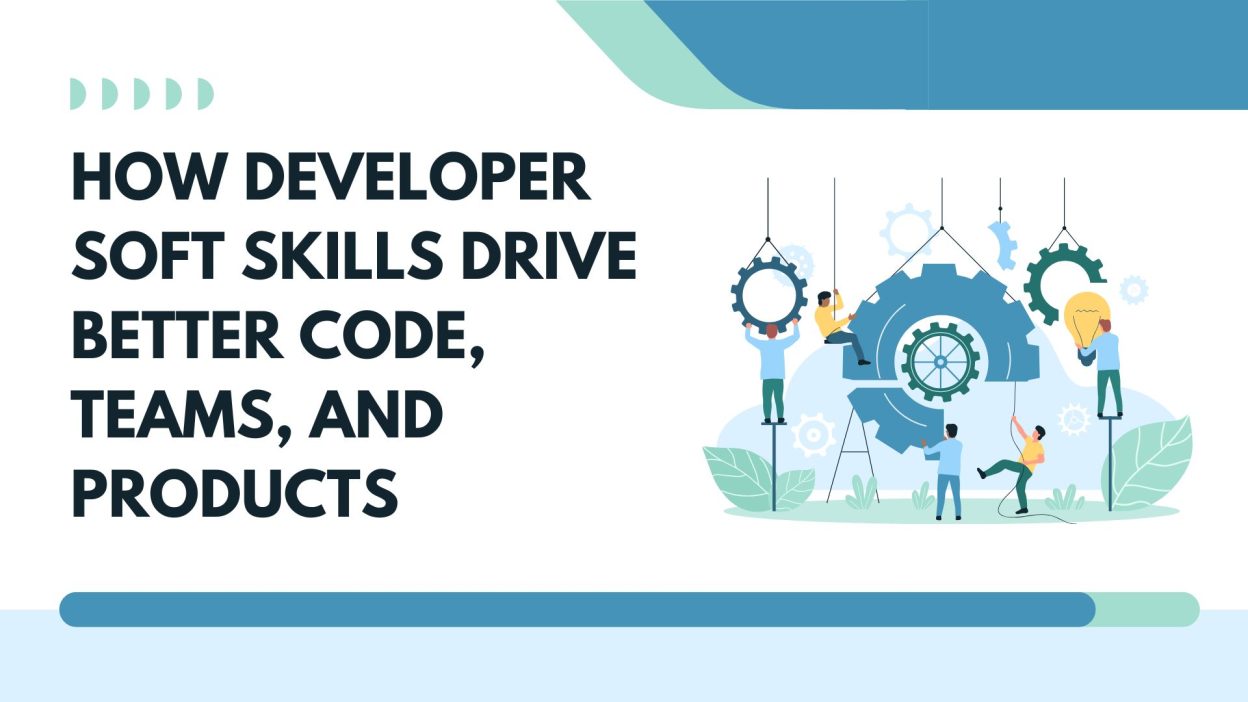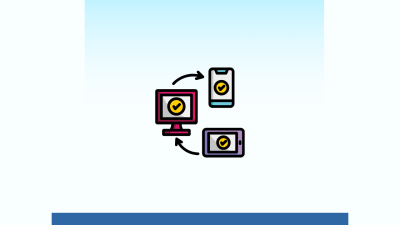As someone who’s spent years both writing code and working alongside other developers, I can say without a doubt that technical skills alone don’t make a great developer. Developer soft skills, those personal and interpersonal abilities are what truly separate good coders from exceptional ones.
These skills can positively impact not just your code, but also the team dynamics and ultimately the products you work on. In this blog, I’ll share how developer soft skills can significantly improve your performance as a software developer and the quality of the teams and products you contribute to.
Table of Contents
Developer Soft Skills and Code Quality
When it comes to code, it’s not just about how smart your solution is, it’s about the little things that make your code easy to read, maintain, and improve. Here’s how developer soft skills help take your code to the next level:
- Attention to Detail: I’ve learned that little mistakes can easily snowball, so I make it a point to double-check everything I do. Skills like focus and patience really help me ensure that my code is as clean as possible. Trust me, those extra minutes make all the difference in preventing future headaches!
- Problem-Solving Mindset: Whenever I face a tricky bug, I don’t just jump in and start hacking away. I step back and think about the problem. Developing soft skills like critical thinking help me break down problems in a structured way. It’s all about staying calm, focusing on the issue, and finding the best solution.
- Adaptability to New Tools: In this ever-changing world of tech, I know I have to stay on top of new tools and frameworks. Soft skills, like being open to change and having a growth mindset, have made it easier for me to embrace new technologies without feeling overwhelmed.
- Clear Documentation: Writing code that’s easy for others to understand is a skill I take pride in. Soft skills, especially communication, are key here. I know that clear, concise comments and documentation are essential—because, trust me, someone else (maybe even future me!) will thank you for it!
Developer Soft Skills and Team Dynamics
Working with a team is so much more than just coding side by side. It’s about collaboration and making sure the team runs smoothly. Here’s how developer soft skills help me contribute to a positive team environment:
- Effective Communication: I’ve been in meetings where everyone is speaking a different language, and it’s frustrating! That’s why I always make sure I’m clear and concise when explaining my ideas. Soft skills like active listening and articulation help me get my point across, and I can tell it makes a big difference in keeping the team on the same page.
- Collaboration and Teamwork: I’m a big believer that teamwork makes the dream work. Soft skills like empathy and respect for others’ ideas help me work better with my teammates, and I love that feeling of accomplishing something together.
- Conflict Resolution: Let’s be real—disagreements happen. But I’ve found that with patience and a willingness to listen, I can turn conflicts into opportunities to learn and grow. Skills like diplomacy and understanding are key for keeping the peace and maintaining team harmony.
- Mentorship and Knowledge Sharing: I’ve had mentors who helped me grow, and now I get to pay it forward! Soft skills like humility and patience have made me a better mentor, and I love sharing knowledge with newer developers. It’s all about building a supportive, collaborative environment where everyone thrives.
Developer Soft Skills and Product Success
At the end of the day, it’s not just about the code you write, it’s about how your code affects the product. Here’s how developer soft skills play a huge role in creating successful products:
- User-Centered Thinking: I’ve worked on projects where I got so caught up in the tech that I forgot to think about the users. That’s why I always remind myself to put the user first. Soft skills like empathy help me think about the real people using the product, which ultimately leads to better design and features.
- Understanding Stakeholder Needs: Sometimes, the people I’m working with don’t always know the technical details, and that’s okay! Soft skills like active listening and emotional intelligence help me understand their needs and make sure I’m building what will actually help them.
- Flexibility in Product Iterations: Things change fast in tech, and I’ve learned that it’s important to stay flexible. Whether it’s new features or last-minute tweaks, skills like adaptability help me roll with the punches and keep things moving smoothly.
- Collaboration with Designers and Product Managers: I know that building a product isn’t a one-person job. Soft skills like collaboration and communication are crucial when working with designers and product managers. It’s all about making sure everyone is on the same page and building something amazing together.
Developer Soft Skills and Personal Growth
For me, growing as a developer isn’t just about learning new languages or mastering frameworks; it’s about growing as a person, too. Here’s how developer soft skills help me keep improving every day:
- Growth Mindset: I’m always looking for ways to improve. Soft skills like being open to feedback and embracing challenges have helped me push past my limits and grow both professionally and personally. It’s not always easy, but I know it’s worth it!
- Time Management: Let’s be real: sometimes I get carried away with coding and forget about the clock. But with skills like organization and focus, I’ve learned to manage my time better and balance work with personal life.
- Resilience to Stress: Software development can be stressful, and I’ve had my share of tight deadlines. But developer skills like emotional regulation and stress management have helped me stay cool under pressure and focus on delivering quality work, even when things get hectic.
- Self-Reflection: After every project, I take a moment to reflect on what went well and what I can improve. Soft skills like self-awareness and humility help me be honest with myself and keep improving, one step at a time.
Developer Soft Skills and Building a Strong Network
I’ve always found that having a solid professional network can make a big difference in my career. Here’s how developer soft skills can help me build and maintain meaningful relationships in the tech world:
- Networking with Purpose: I don’t just attend events for the free coffee, I go to meet people who inspire me and who I can learn from. Skills like active listening and curiosity help me ask the right questions, engage in meaningful conversations, and build lasting relationships with fellow developers and industry professionals.
- Giving Back to the Community: I’ve always believed that giving back is a great way to grow professionally. Whether it’s helping someone with a coding problem or sharing knowledge, skills like generosity and empathy allow me to be an active and supportive part of the tech community.
- Effective Follow-up: After meeting someone at an event, I make sure to follow up with them, whether it’s a quick message or scheduling a coffee chat. Soft skills like remembering details and being considerate in follow-up communication helps me build lasting connections.
- Creating a Collaborative Network: I don’t just network for myself; I look for ways to collaborate. Whether it’s co-authoring articles, hosting a webinar, or contributing to open-source projects, skills like collaboration and teamwork are great tools for creating a strong network of mutually supportive professionals.
Developer Soft Skills and Embracing Feedback
One of the most important things I’ve learned as a developer is how to take feedback like a pro. Here’s how developer soft skills help me grow from constructive criticism:
- Emotional Resilience: I used to get defensive when someone pointed out my mistakes, but I’ve learned that feedback is a gift. Skills like emotional resilience help me stay calm, absorb feedback, and use it to improve my work instead of feeling discouraged.
- Seeking Feedback Actively: Now, I’m proactive about asking for feedback, whether it’s from peers or managers. It’s one of the best ways to ensure I’m always improving. Skills like humility and curiosity make it easier to approach others and ask for advice without feeling intimidated.
- Processing Criticism Objectively: When I receive feedback, I make sure to process it logically. Instead of taking things personally, I focus on how I can improve. Skills like emotional intelligence allow me to filter out the noise and focus on actionable insights.
- Seeking Diverse Perspectives: I believe in asking for feedback from a wide variety of people. Whether it’s a junior developer or a senior engineer, soft skills like openness and inclusivity allow me to gain valuable insights from a range of different perspectives.
Developer Soft Skills and Handling Failures
Let’s face it, sometimes things don’t go as planned. But what sets great developers apart is how they handle failure. Here’s how developer soft skills help me bounce back stronger after setbacks:
- Resilience and Perseverance: I’ve had projects that didn’t go as expected, but I’ve learned to embrace those failures. Soft skills like perseverance and a positive mindset help me get back up, learn from my mistakes, and continue pushing forward.
- Learning from Mistakes: When something goes wrong, I don’t beat myself up about it. Instead, I reflect on what went wrong and what I can do differently next time. Soft skills like self-awareness and introspection are essential for learning from failures and growing from them.
- Using Failure as a Teaching Moment: I’ve learned to turn failures into learning experiences, not just for myself but for my team. Soft skills like teaching and mentoring help me share lessons learned from setbacks and encourage others to learn from them as well.
- Being Patient with the Process: Not every failure can be fixed immediately, and I’ve learned to be patient with the process of fixing things. Skills like patience and time management help me tackle issues step-by-step without rushing to a solution too quickly.
Developer Soft Skills and Leading by Example
As a developer, I’m not just responsible for my own work; I’m also part of a bigger team. Here’s how developer soft skills help me lead by example and inspire others:
- Leading with Empathy: I know that a leader’s job isn’t just to tell others what to do, it’s to support them. Soft skills like empathy allow me to understand my team members’ struggles and offer encouragement when they need it most.
- Motivating the Team: As a developer, I often take on a mentoring role within the team. Soft skills like positivity and encouragement help me motivate others, keeping morale high even when projects get tough.
- Setting the Tone for Collaboration: As a leader, I’ve learned that my approach can set the tone for the entire team. Soft skills like collaboration and transparency make it clear to others that open communication and team effort are at the core of success.
- Acknowledging Others’ Achievements: I make it a point to celebrate my team’s wins, no matter how big or small. Soft skills like gratitude and appreciation help me show that I value their contributions and encourage a positive team environment.
Developer Soft Skills and Enhancing Collaboration with Non-Technical Teams
One of the most valuable lessons I’ve learned is how important it is to work well with non-technical teams, like product managers or designers. Here’s how developer soft skills help me bridge the gap:
- Understanding Different Perspectives: I’ve realized that technical jargon doesn’t always make sense to everyone. Soft skills like patience and communication allow me to explain complex ideas in a way that’s easy for non-technical team members to understand, ensuring everyone is aligned on the project.
- Building Relationships Across Teams: Collaborating with non-technical teams is an important skill I’ve honed. Soft skills like empathy and active listening help me understand their needs and goals, ensuring the tech side of the project aligns perfectly with the product’s vision.
- Tailoring My Communication Style: When I talk to non-technical stakeholders, I adapt my language to suit their level of understanding. Skills like adaptability and clarity make it easier for me to ensure that everyone is on the same page, regardless of their technical background.
- Being Patient with Process Differences: Working with non-technical teams often means navigating different workflows and timelines. Skills like patience and open-mindedness help me work through these differences without frustration, ensuring we meet our collective goals.
Developer Soft Skills and Managing Expectations
Managing expectations with clients is something I’ve found crucial throughout my career. Here’s how developer soft skills can help me maintain healthy relationships with clients and project stakeholders:
- Clear and Honest Communication: I’ve learned that setting clear expectations from the start can save everyone a lot of stress later. Soft skills like transparency and honesty help me communicate timelines, challenges, and progress with stakeholders in a way that’s both realistic and professional.
- Managing Stressful Situations: Sometimes, things don’t go as planned, and clients get anxious. Skills like emotional regulation and problem-solving help me stay calm, find solutions, and manage the situation in a way that keeps the project on track and everyone happy.
- Setting Realistic Deadlines: One of the most important lessons I’ve learned is how to set achievable timelines. Soft skills like time management and prioritization allow me to set deadlines that are both realistic and in alignment with the project’s scope.
- Keeping Stakeholders Informed: I always make sure to regularly update stakeholders on the project’s progress. Soft skills like proactive communication and organization help me keep everyone in the loop, ensuring there are no surprises and no unmet expectations.
Conclusion
As someone who’s been both a developer and a team lead, I can say with confidence that developer soft skills can change the entire face of a project. They not only help improve the quality of your code but also the way you interact with others and grow as a person. If you focus on developing these skills, you’ll not only become a better developer but also a more valuable team member.
So take it from me: it’s not just about writing perfect code,it’s about how you approach problems, collaborate with your team, and keep growing. The more you work on your developer soft skills, the more you’ll see the positive impact on your career and your team’s success like I have seen at Qtec Solution Limited. You got this!
Frequently Asked Questions
1. Why are developer soft skills important?
Developer soft skills are crucial because they help you communicate effectively, collaborate with teams, handle feedback, and manage projects efficiently. These skills make you a well-rounded developer, improving both your individual performance and your ability to work well within a team.
2. How can I improve my developer soft skills?
To improve your developer soft skills, practice active listening, seek constructive feedback, engage in team activities, and focus on clear communication. You can also work on developing emotional intelligence and time management skills to better handle workplace challenges.
3. What are some examples of developer soft skills?
Some key developer soft skills include communication, problem-solving, empathy, adaptability, teamwork, and time management. These skills help you navigate both technical challenges and interpersonal interactions in the workplace.
4. How do soft skills affect coding?
Soft skills like attention to detail, patience, and problem-solving play a big role in coding. They help you write cleaner, more maintainable code, handle debugging more effectively, and collaborate well with other developers, ultimately improving the quality of your work.
5. Can soft skills help me grow in my career as a developer?
Absolutely! Soft skills are often what set top developers apart. By improving your communication, leadership, and collaboration abilities, you’ll build stronger relationships, gain respect from colleagues, and open up opportunities for career advancement and leadership roles.




